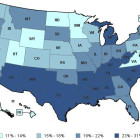
OJJDP Finds Information Gap in Juvenile Transfer Cases
|
Since the 1980’s, nearly every state has passed or expanded juvenile transfer laws that allow kids to be tried as adults in some cases. But a recent report from the federal Office of Juvenile Justice and Delinquency Prevention (OJJDP) found that only 13 states publicly report how many kids are transferred each year and even fewer report any details of those transfers. According to the report, in the states that publicly reported, 14,000 youth were transferred to criminal courts in 2007, the last year data was available. However, that number has declined sharply since 1994. Writing in the report, OJJDP Acting Administrator Jeff Slowikowski said, “To obtain the critical information that policymakers, planners, and other concerned citizens need to assess the impact of expanded transfer laws, we must extend our knowledge of the prosecution of juveniles in criminal courts.”
Young people accused of a crime are sent to juvenile or criminal court, in part, based on their age — 18 in most states, but as young as 16 in others, the report says.








